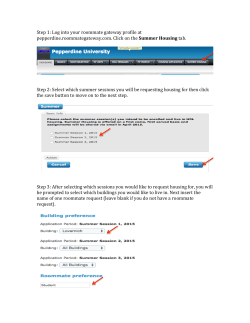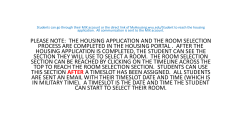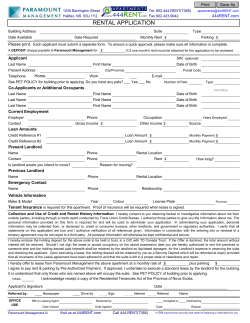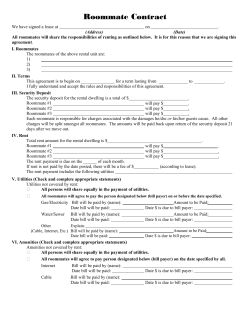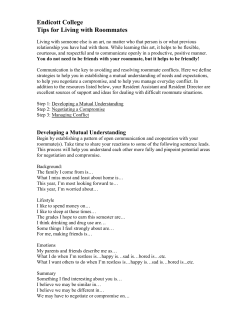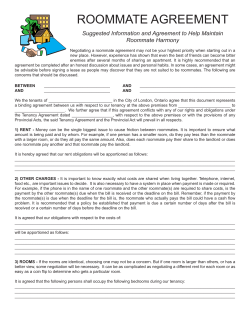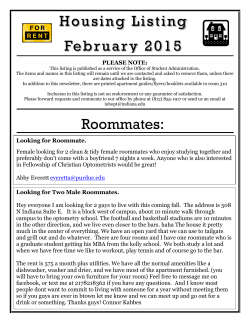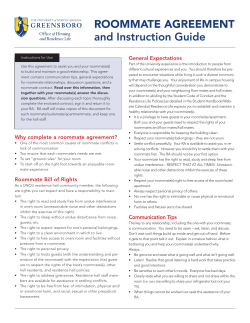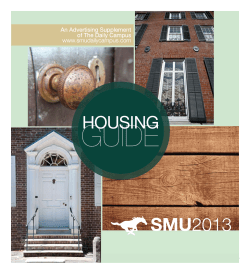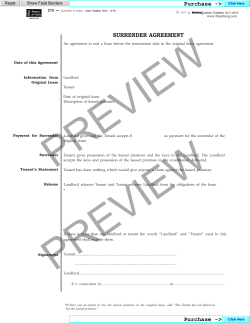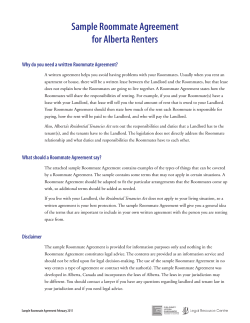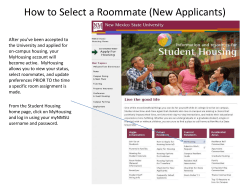
ROOMMATES
Education for Justice FACT SHEET H-5 Fall 2011 ROOMMATES WHO SHOULD BE ON THE LEASE? All roommates should be on the lease. If you have a written lease, you cannot take in a roommate without the landlord’s permission. If you add or change a roommate, talk to the landlord about changing the lease. If you do not have a written lease, you may not need the landlord’s permission, but it is a good idea to get it. Otherwise, the landlord can give you a notice to move. AM I RESPONSIBLE FOR THINGS MY ROOMMATE DOES? Yes. You can be evicted because your roommate broke the lease – with noise, drugs, unauthorized pets, or any other violation. WHO IS RESPONSIBLE FOR THE RENT? Each roommate probably is responsible for all of the rent, unless you have a written lease that says otherwise. If your roommate does not pay the rent, or moves out, your landlord can make you pay all of it. If you don’t pay, you can be evicted. To avoid this, you can try to write into the lease that each roommate is only responsible for his or her own share of the rent. Many landlords won’t agree to this. Remember to get signed, dated receipts whenever you pay rent – whether you pay it to a roommate or the landlord. If you pay with a money order, you still need a receipt from the landlord! WHO IS RESPONSIBLE FOR THE UTILITIES? If you put your name on the account, you will be responsible for the whole bill. If there is only 1 meter for 2 or more units, the landlord is usually responsible. See our fact sheet H-8 Shared Utility Meters. The utility company may tell you that every roommate is responsible for the whole bill, even if their name is not on the account. We disagree. We think that only the named customer is responsible. If a phone, gas, electric, or water company wants you to pay a bill, and you never agreed to service in your name, talk to your legal aid office. Talk to your roommates about whose name will be on the account. If your name is on the account, budget enough money to pay the whole bill each month, in case a roommate does not pay. If you miss payments, you can get late fees, a bad credit rating, or the utilities can be shutoff. You can set up a budget plan with the utility, so you pay the same amount each month. That way, each roommate knows how much they owe each month. For More Help Go to www.LawHelpMN.org When you call to get utility service, they can ask who lives with you. You do not have to tell them. If you do not want your name on the account, then do not send the utility a check with your name on it. Tell your roommates not to give your name to the utility. And check the monthly bill to make sure your name is not on it. If you move in with someone who has an old unpaid bill, you can still get service in your name. If you are denied service, call legal aid. What you cannot do is “account rotation.” Account rotation means roommates running up a bill in one person’s name, and then switching the account to another roommate while the person with the unpaid bill still lives there. WHAT SHOULD I DO WHEN I MOVE OUT? Give proper written notice to your landlord. If you have a lease, check it to see what notice is needed. If you don’t have a lease, the landlord must get your notice at least a full month before you move out. In other words, to move out on July 31, you need to give notice in June. Write to all utility companies that have your name on accounts and tell them to switch your accounts to your new address or to cancel them. Do it in writing and keep a copy so that you have a record of it. If you don’t notify them, you will still be responsible for your roommate’s bills. CAN I EVICT A ROOMMATE? Usually only a landlord can file an eviction case. You can ask your landlord to file an eviction that names only your roommate, and not you, but this can be complicated and risky. If your roommate is threatening you, harassing you, or hurting you, apply for an Order For Protection (OFP) or a Harassment Order. The court could order the roommate to stay away from the apartment. See our fact sheet F-5 Orders for Protection. WHAT IF A ROOMMATE WON’T PAY A BILL? You can sue in Conciliation Court. You do not need a lawyer. See our fact sheet C-1 Conciliation Court. CAN THE LANDLORD WITHHOLD THE DEPOSIT FOR WHAT MY ROOMMATE DID? Yes, but the landlord has to follow the law on deposits. See our fact sheet H-29 Security Deposits. To find other Legal Aid Society materials, including any fact sheets mentioned in this document, go to www.lawhelpmn.org/LASMfactsheets. Minneapolis Legal Aid – CLE MN Legal Services Coalition 2324 University Avenue W. – Suite 101B St. Paul, MN 55114 Don’t use this fact sheet if it is more than 1 year old. Write us for updates, a fact sheet list, or alternate formats. Fact Sheets aren’t a complete answer to a legal problem. See a lawyer for advice. © 2011 Mid-Minnesota Legal Assistance. This document may be reproduced and used for non-commercial personal and educational purposes only. All other rights reserved. This notice must remain on all copies. Reproduction, distribution, and use for commercial purposes are strictly prohibited.
© Copyright 2025
